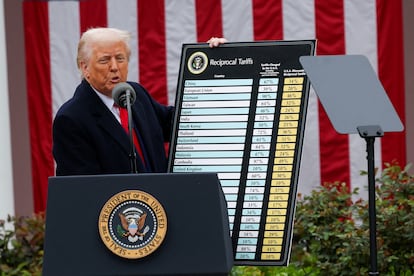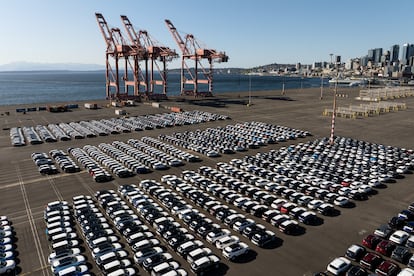US Trade Court declares Trump’s tariffs illegal
Judges believe the president has exceeded his authority in trade war

Donald Trump suffered the biggest judicial setback of his second term as president on Wednesday. The United States Court of International Trade, the specialized body with jurisdiction over the matter, declared the across-the-board tariffs on imports imposed by Trump under an emergency powers law illegal. In practice, the decision blows up the Republican’s generalized trade war. Markets celebrated the ruling, as the tariffs threatened to drag the U.S. into recession and cause prices to rise.
The Trump administration has already given notice that it will appeal the ruling, handed down by a three-judge panel. Initially, the appeal should be filed with a federal appeals court, but the case may end up reaching the Supreme Court, which has a majority of six conservative justices versus three progressive female judges.
The ruling arrived in settling two lawsuits arguing that Trump had encroached on the powers of Congress, overstepped his authority, left trade policy at the mercy of his whims and mood swings, and unleashed economic chaos.
The New York-based court’s decision nullifies and declares illegal the vast majority of the tariffs enacted by Trump, including the 25% taxes on imports from Canada and Mexico and 20% on imports from China under the guise of Washington’s claim Beijing is not doing enough to stop exports of fentanyl precursors, as well as the bogus “reciprocal tariffs” imposed globally and announced on Trump’s so-called Liberation Day, which were subsequently reduced across the board by 10% after the president rectified and granted a partial 90-day truce in the face of market pressure.
“The challenged Tariff Orders will be vacated and their operation permanently enjoined. There is no question here of narrowly tailored relief; if the challenged Tariff Orders are unlawful as to Plaintiffs they are unlawful as to all,” the three judges unanimously concluded. One of them, Timothy Reif, was appointed by Trump himself; another, Jane Restani, by Ronald Reagan; and the third, Gary Kazman, by Democrat Barack Obama.
“The question in the two cases before the court is whether the International Emergency Economic Powers Act of 1977 (“IEEPA”) delegates these powers to the President in the form of authority to impose unlimited tariffs on goods from nearly every country in the world,” the 49-page ruling says. “The court does not read IEEPA to confer such unbounded authority and sets aside the challenged tariffs imposed thereunder,” it adds.

A 10-day deadline
The declaration of nullity of the challenged tariff decrees is effective immediately, but the court, in another three-page resolution, gives a 10-day deadline for the necessary administrative orders to be issued to give effect to its decision. It is unclear whether the government will continue to seek to enforce the illegal tariffs during this period. Ongoing trade negotiations with other countries are also left on the back burner, at least provisionally. Trump used the tariffs as a tool to apply pressure.
The ruling does not go into analyzing the 25% import tariffs on steel, aluminum, vehicles and components, issued under other provisions. Hypothetically, Trump could seek to impose new tariffs on other products or using other delegations of power. The ruling recognizes the president’s ability to approve tariffs for a limited period of 150 days and with a 15% ceiling in response to the trade deficit, under cover of another legal provision. Confusion seems to be assured.
The judges recall that the authority to impose tariffs is generally vested in Congress, not the president. IEEPA allows the president to regulate imports and exports in response to certain non-war emergencies, while stressing that the triggering event must be an “unusual and extraordinary threat.”
Trump passed various declarations of national emergency and then used them to arrogate to himself the power to tax imports in a highly questionable interpretation of the law that the Court of International Trade finds impermissible. No other president has used IEEPA to impose tariffs like Trump did in the five decades since that law was enacted.
The import duties were appealed to the Court of International Trade by both a dozen Democratic states and The Liberty Justice Center on behalf of a group of companies (V.O.S. Selections, Genova Pipe, MicroKits, FishUSA and Terra Cycling) that claimed to have suffered economic harm from the tariffs. The ruling is common to both cases.

“Unconstitutional”
The judges analyze, on the one hand, global and retaliatory tariffs, i.e., tariffs against other countries, and on the other, those related to drug trafficking and immigration.
Regarding global and retaliatory tariffs, they point out that the law grants emergency powers to the president to “regulate commerce.” In some cases, that can be done with tariffs, but “under any interpretation that is consistent with the separation of powers principles underlying the nondelegation and major questions doctrines, it does not authorize anything as unlimited as global or retaliatory tariffs,” they argue. “Any interpretation of IEEPA that delegates unlimited tariff authority is unconstitutional,” they rule.
For their part, in the case of the tariffs dictated by Trump taking as a pretext the trafficking of fentanyl or the entry of immigrants, the judges argue in that case the legal requirement that such taxes serve to “meet an unusual and extraordinary threat” is not met.
The judges say that imposing taxes on legally imported goods does not serve to “address” the problems of immigration or drug trafficking. They do not consider valid the Trump administration’s argument that the tariffs address those problems by putting pressure on the governments of Mexico, Canada, and China. “The orders would have to ‘tackle’ that specific problem, not create a ‘lever’ ostensibly to do so,” they reason. If Trump’s indirect pressure argument is admitted, “then anything goes.” The justices do not dispute that such a strategy can be effective, but they rule that it is simply not permitted by law.
“The court holds that IEEPA does not authorize any of the worldwide, retaliatory, or anti-trafficking [immigrant or drug] tariff orders,” the ruling states in its operative part. “The global tariff and retaliatory orders exceed any authority granted to the President by IEEPA to regulate importation through tariffs. The anti-trafficking tariffs are invalid because they do not address the threats set forth in those orders,” it adds, before saying that conclusion entitles the plaintiffs to summary judgment without further proceedings.
The decision is perhaps the biggest setback suffered so far by Trump in the courts during his second term, in which the president is testing the limits of presidential power within his authoritarian drift.
One of the lawsuits had been filed in April by a dozen Democratic states, led by New York. They believed that Trump had illegally imposed unprecedented tax increases on Americans, bypassing the authority of Congress.
“We sued the Trump Administration over their ridiculous tariff policy — and we WON!” tweeted New York Governor Kathy Hochul. “A tariff is just a backdoor tax. New York is fighting to stop these tariffs and put money back in your pocket,” she added.
“This decision is a major victory for our efforts to uphold the law,” wrote New York Attorney General Letitia James. “The law is clear: no president has the power to single-handedly raise taxes whenever they like.”
A White House spokesman asserted that “it is not for unelected judges to decide how to properly address a national emergency.” Other countries’ “nonreciprocal treatment of the United States has fueled America’s historic and persistent trade deficits,” spokesman Kush Desai said in a statement quoted by Bloomberg. “These deficits have created a national emergency that has decimated American communities, left our workers behind, and weakened our defense industrial base — facts that the court did not dispute,” he added.
Trump was active on his social network, Truth, with mixed messages, but did not tweet anything related to the ruling Wednesday.
Sign up for our weekly newsletter to get more English-language news coverage from EL PAÍS USA Edition
Tu suscripción se está usando en otro dispositivo
¿Quieres añadir otro usuario a tu suscripción?
Si continúas leyendo en este dispositivo, no se podrá leer en el otro.
FlechaTu suscripción se está usando en otro dispositivo y solo puedes acceder a EL PAÍS desde un dispositivo a la vez.
Si quieres compartir tu cuenta, cambia tu suscripción a la modalidad Premium, así podrás añadir otro usuario. Cada uno accederá con su propia cuenta de email, lo que os permitirá personalizar vuestra experiencia en EL PAÍS.
¿Tienes una suscripción de empresa? Accede aquí para contratar más cuentas.
En el caso de no saber quién está usando tu cuenta, te recomendamos cambiar tu contraseña aquí.
Si decides continuar compartiendo tu cuenta, este mensaje se mostrará en tu dispositivo y en el de la otra persona que está usando tu cuenta de forma indefinida, afectando a tu experiencia de lectura. Puedes consultar aquí los términos y condiciones de la suscripción digital.








































